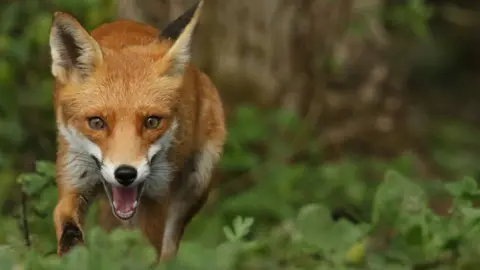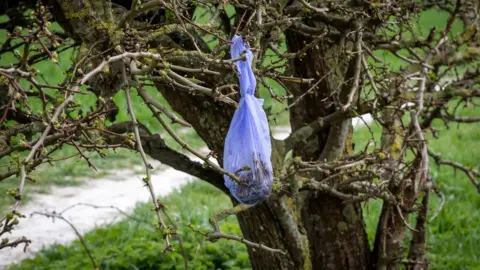Dog poo forms a significant part of foxes' diet
 Getty Images
Getty ImagesDog poo forms a significant part of the diet of red foxes living in pine forests in the Scottish Highlands, a study has revealed.
Researchers found that dog faeces has a calorific content similar to foxes' wild prey.
But it is much easier to "hunt" - with the foxes feeding on it especially when wild prey is scarce.
The study said it was unprecedented for one species to eat the faeces of another in such large quantities.
It found that domestic dog DNA was the second most frequent species found in fox stool samples, at about 40%.
Several theories were considered as to why this was the case, including a possible confusion between fox and dog DNA since the two are closely related.
Important food source
But the researchers ultimately concluded that dog poo had become an important food source for foxes to fall back on in times of scarcity.
They said that dog faeces may benefit foxes over their competitors or prey species - just as bird feeders in gardens benefit some species of birds while others are displaced.
In addition, the availability of dog faeces and its consumption by wild animals creates risks of disease and parasite transmission, and of introducing new pathogens.
It also highlights how the behaviour of foxes living in the pine forests of the Cairngorms can be affected by visits from humans and their pets - and in particular how important it was for dog walkers to properly dispose of dog faeces.
 Getty Images
Getty ImagesThe study was a collaboration between scientists at the University of Aberdeen, the University of Grenoble Alps, Forestry and Land Scotland and Cairngorms Connect and has been published in the Ecology and Evolution journal.
It had initially set out to examine the diet of foxes and pine martens to better understand how the two predators manage to coexist in the pine forests despite having very similar eating habits.
Cristian Navarro, a PhD student at the University of Aberdeen who was one of the report's co-authors, said: "The fact that foxes consume dog faeces in the amounts we have found is unprecedented.
"Rabbits and other related species are well-known to consume their own faeces but consumption of the faeces of another species has seldom been documented and likely represents an overlooked interaction among wild animals.
"This phenomenon would be undetectable through traditional diet study methods, but by using DNA-based techniques our study has revealed this interaction for the first time, leading to important questions about how human activities are affecting wildlife."
